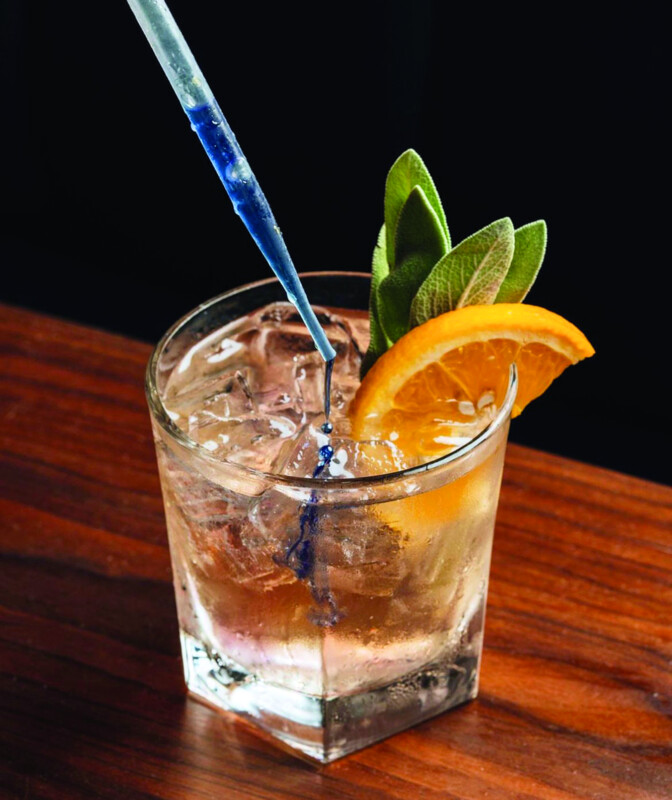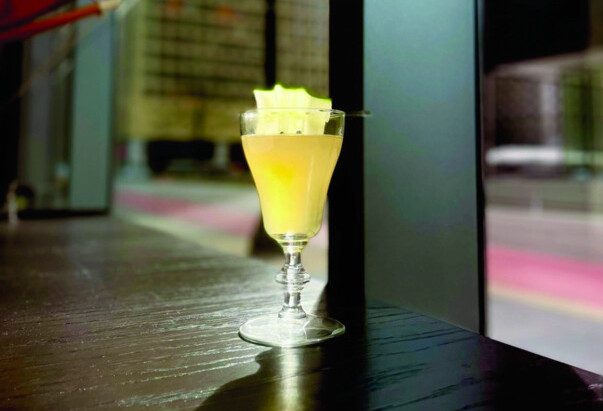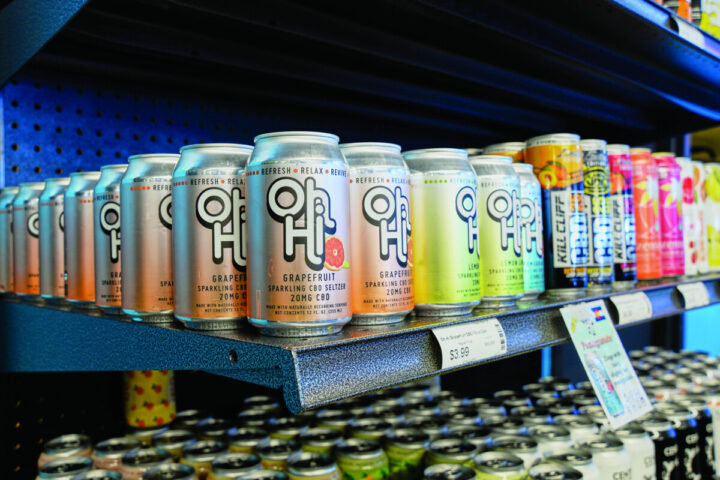
It feels like cannabis has been on the cusp of making a major impact on the drinks industry for a long time. Hemp-based beverages and cocktail ingredients have gained favor and then faded repeatedly over the last several years as consumers show increasing interest in cannabis while federal regulations stymie its growth. Though change is happening slowly—more slowly than many cannabis proponents and CBD companies would like—it’s also happening steadily nationwide, driven by bartenders who embrace cannabis products, retailers who offer increasing shelf space to CBD seltzers and beverages, and a growing crop of CBD drinks producers who are introducing interesting new products that contain cannabis compounds. For most in the cannabis industry, the future remains bright even if the end-goal of widespread cannabis acceptance feels far off.
Bryan Rojas, a cannabis advocate and bartender at The Dearborn in Chicago, believes the outlook for cannabis continues to improve, albeit at a slow pace. Rojas says the lack of consistency among cannabis products and their potency is among the industry’s biggest roadblocks right now, adding that consumer education is the best way to combat that. “People who work in restaurants and bars have an opportunity to teach people about this,” he explains. “We have to start seeing cannabis as an ingredient and treating it as an ingredient. When you approach it with a drug mentality, people don’t feel safe, but making people feel safe and welcome comes with hospitality. I like to connect with people through spirits, but my biggest passion is cannabis. We can create a harmony between these two great industries.”
At The Dearborn, Rojas makes a cucumber syrup that’s sweetened with Red Belly CBD Honey, a product that has both sweet and herbal notes. The CBD honey cucumber syrup is currently mixed into the Maid In Chicago ($16), a cocktail that also contains Roe & Co. Irish whiskey, St-Germain liqueur, and lemon juice. “We have to make CBD approachable for people, and everyone loves honey,” Rojas notes. “We have to find ingredients that match with CBD, that don’t hide it but complement it. It’s an approachable drink because of the cucumber and whiskey flavors.”

In Florida, the nine-unit Tap 42 Craft Kitchen + Bar makes a CBD butterfly pea tea infusion, which it serves in a dropper alongside a couple cocktails. Corporate beverage director and mixologist Paige Nast Calero says the drinks are well received because they’re interactive—guests control how much CBD infusion they add through the dropper—and notes that the perception of CBD and cannabis products has changed greatly over the last few years. Tap 42’s CBD-enhanced drinks include the Strawberry Kush ($14), made with Haku vodka, basil syrup, lemon juice, and strawberries, and the Gin ’N Chronic ($14), comprising Gray Whale gin and tonic syrup. Both cocktails are served with the CBD infusion in a dropper.
“The landscape for CBD cocktails has continued to expand, especially as the attitudes toward cannabis shift with the increasing legalization of both recreational and medicinal use,” Nast Calero says. “CBD adds a fun element to cocktails and can have a mildly calming effect. In our experience, any stigma that was previously associated with CBD has largely disappeared. It’s become a more mainstream ingredient and people are not only accepting it but excited about it.”
Sharla Evans, director of catering for SGWS Wynwood, an event and hospitality space in Miami owned by Southern Glazer’s Wine & Spirits, agrees that a large swath of people now fully embrace CBD as a cocktail ingredient. “The initial hesitation has worn off and consumers are more comfortable with the idea of integrating CBD into cocktails,” Evans says. “The use of CBD in beverage programs and event spaces can offer a unique wellness-tailored experience to a specific clientele.”
At SGWS Wynwood, Evans has incorporated CBD into drinks in many forms, from edibles as drinks garnishes to CBD oil to CBD seltzers mixed into cocktails. One of her perennial requests at events is the Unicorn Tears, mixed with Bombay Sapphire London Dry gin and Mad Tasty Unicorn Tears hemp-infused sparkling water. “The perception of CBD as a bar and cocktail ingredient has certainly shifted over the last few years,” Evans adds. “With the legalization of hemp-based products on a national scale, the stigma around its related products has minimized. CBD can provide a unique and beneficial addition to a beverage program in a safe space.”

Widespread Growth
Across the country in Seattle, Pine Box Bar manager Cynthia Huntley offers an alcohol-free CBD drink that she says is enjoyed by guests seeking an alternative to traditional cocktails. Her bar offers Aprch Mint + Cucumber CBD soda on draft ($8 a 12-ounce pour) and mixes it into the Devil’s Lettuce ($12), a no-alcohol riff on the Mojito that’s made with the CBD soda, fresh mint, and sugar. “The novelty of CBD drinks has dwindled, but the demand for options outside of alcohol has increased, leaving plenty of space for CBD in drinks programs,” Huntley says. “CBD has become a great alternative for people seeking ways to enjoy adult beverages without the hangover. The medicinal benefits have become more widely accepted, which has established CBD as a great product to use in cocktails and cocktail alternatives. Folks aren’t surprised to see it on a menu anymore.”
Hemp Bar, an on-premise cannabis venue and retail space in Portland, Oregon owned by CBD producer East Fork Cultivars, also offers a full roster of non-alcoholic CBD drinks. East Fork Cultivars makes a CBD product called Organic Beverage Enhancer that it mixes into selections like the Arnie Palmer ($7), blending black tea, lemon, and Clear Minds kombucha, and the Cocomo ($10), mixing pineapple, lime, and orange juices with coconut water and fresh nutmeg. Organic Beverage Enhancer ($20 a 1-ounce bottle) is East Fork Cultivars’ top-selling product, and Hemp bar also sells pre-mixed CBD drinks by Rogue Ales & Spirits and The Brothers Apothecary.
“Adding CBD to mixed drinks is a simple, affordable, and effective way to relax and unwind,” says East Fork Cultivars creative director Valerie Yermal. “We strongly believe that CBD remains a fantastic addition to any bar. Once federal legalization is more clear, I believe CBD will become more popular, and people will feel more comfortable trying it.”
Exploration off-premise has propelled the CBD drinks category in many areas of the country. Colorado beverage retailers offer a dizzying array of CBD seltzers and waters now, and many store owners say they’re well received by a wide variety of shoppers. Argonaut Wine & Liquor in Denver stocks some 45 different CBD soda SKUs from 15 companies. “We started out with just one brand and now I get one or two companies trying to sell us their product every week,” says store manager Bob Olson. Argonaut’s top performing CBD beverage is Weller Black Cherry CBD sparkling water ($4 a 12-ounce can).
Meanwhile at Applejack Wine & Spirits, which has locations in Colorado Springs, Wheat Ridge, and Thornton, Colorado, sales of CBD sodas have increased steadily for the last couple years, and beer manager Ian Hanson says sales are up by about 40% so far in 2023. Applejack carries 40-45 CBD SKUs, which is up significantly from just a few years ago. Top-sellers at Applejack include Wyld CBD Sparkling waters ($4 a 12-ounce can) and W*nder CBD sparkling beverage ($5 a 12-ounce can). “The category is up year-on-year and has seen steady growth each of the past few years,” Hanson explains. “The ubiquity of CBD products now versus even three years ago has led to a more knowledgeable customer base. There has been demonstrable growth in popularity and demand.”

The Seltzer Surge
A bevvy of new CBD- and hemp-enhanced sparkling water products have flooded the drinks industry, creating an entirely new category for cannabis aficionados. While these products have no alcohol, they do have varying levels of CBD or hemp derivatives in them, and they’re capitalizing on the increasing number of consumers who want social drinks without alcohol. “People of all ages are rethinking their relationship with booze,” says Jeng cofounder Christopher Lackner. “CBD drinks are a perfect alternative for anyone looking for a little relaxation without intoxication.”
Jeng offers a portfolio of cocktail-inspired CBD drinks made with fruit juices and natural ingredients, including the Moscow Mule, Paloma, and Jeng & Tonic (the products average $20 a 4-pack of 12-ounce cans). The beverages are sold online and in a variety of alcohol-free stores nationwide, and they’re listed on a handful of restaurant menus in California, New York, Michigan, Illinois, and Colorado. “For those who might be new to CBD drinks, I tell them they should think of CBD like caffeine, but in the other direction,” Lackner says. “Whereas caffeine gives you a lift, CBD provides light relaxation, and it affects everyone differently.”
Shimmerwood CBD seltzer co-founder Chuck Mascari agrees that the recent increase in demand for CBD drinks is directly related to the decreased demand for alcohol products among many consumers. Shimmerwood’s line includes Ginger Orange, Razz Lime, Chai Cherry, and Just Hemp seltzers ($40 an 8-pack of 11.5-ounce cans), and Mascari says sales are trending up 50% this year, the brand’s second year on the market. The seltzers are sold in restaurants, bars, liquor stores, and specialty food stores in Connecticut, Maine, Rhode Island, Vermont, and New York, and the brand is looking at opportunities to expand to the West Coast.
“From day one, our objective has been to incorporate the flavor of CBD into the beverage profile,” Mascari explains. “It’s like when you go to a bar and order a cocktail—you want to taste the alcohol in the drink but you don’t want it to overwhelm the experience. Our goal is to make CBD approachable and social. We see this category growing exponentially over the next few years.”
Aprch Beverage Co. co-founder Brett Wiley also believes large growth is imminent, and adds that in many instances it’s already happening. Aprch launched in 2019 when there were only a couple CBD drinks on the market, and now Wiley says new offerings launch almost daily. The Aprch line includes the CBD sparkling water flavors Huckleberry, Cherry + Lime, Fruit Punch, Blackberry, Mint + Cucumber, Watermelon, and Lemon + Lime ($4 a 12-ounce can; $13 a 4-pack). The products are sold in more than 2,000 retail locations in eight states and online. “The potential popularity of CBD as an ingredient is deprived by a lack of government regulation, which is currently hindering the whole category,” Wiley says. “The future of CBD drinks is promising, but the industry’s regulatory challenges could impact growth and acceptance in the mainstream market.”

Cloud Water was also an early mover in the CBD sparkling beverage space, having debuted in 2018. Today, the portfolio includes flavors like Blood Orange & Coconut, Grapefruit Mint & Basil, Half Tea & Half Lemonade, Blackberry Lemon & Rosemary, Dark Chocolate & Strawberry, and Watermelon & Ginger ($58.99 a 12-pack of 12-ounce cans). Cloud Water cofounder and CEO Marc Siden agrees that the lack of government regulations is hindering growth for CBD-enhanced drinks and food. “I’m pretty confident that when the regulations do come, we’ll see a second mad rush to enter or reenter the CBD drinks space,” he says. “We’re definitely seeing a massive shift in consumer interest toward non-alcoholic beverages. But alternatively, because of our bold and delicious flavor combinations, we’re also seeing Cloud Water positioned as an excellent additive to cocktails and mocktails.”
Though it’s alcohol-free, the Aplós brand takes a nod from the spirits playbook, packaging its hemp-infused drinks in large glass bottles reminiscent of spirits. The label offers two varieties: Aplós Calme, which has flavors of yuzu, basil, shiso, and dandelion, and Aplós Arise, which has flavors of agave flower, lemon verbena, and black sarawak ($48 a 575-ml.; $88 for a combo pack of both flavors). The brand launched with distributor partners in New York, Washington, and California earlier this year and has plans to expand nationwide. Currently, Aplós is available in more than 150 bars, restaurants, hotels, and retail stores. “We believe that the bar will look really different in a few years—it’s already starting to evolve,” says Aplós co-founder David Fudge. Co-founder Emily Onkey adds that Aplós has been embraced by both consumers who do and don’t drink alcohol.
The ability to coexist in the alcohol space is paramount going forward for CBD beverage marketers. Flyers Cocktail Co. has a roster of sparkling CBD drinks that are designed to evoke popular alcohol calls, including Bkln Gold, with flavors of oak, vanilla and bitters; Sydney Spritz, with notes of botanical bitters and mandarin; and Tokyo Marg, with elements of yuzu, bitter orange, and chili ($20 a 4-pack of 8-ounce cans). The drinks are available in the Northeast and online. Flyers founder Craig Lewis says his brand gives people the sense of a traditional cocktail journey and notes that he worked with New York City mixologist Ivy Mix on the formulation specifically for that purpose.
“Hemp has a very bitter taste, and unlike many other CBD drinks that mask the bitterness, we lean into it and it gives our cocktails a more complex and complete flavor profile,” Lewis says. “The way we envision the future of drinking is all-encompassing. When you walk into a bar or social event, everyone will be drinking. Some might have an alcoholic beverage, some may have a zero-proof or low-alcohol cocktail, and some will have a CBD cocktail or THC beverage. But we’ll all be drinking. That is the future we’re building.”